外研版七年级上短语和完成句子
七年级上英语外研知识点归纳总结
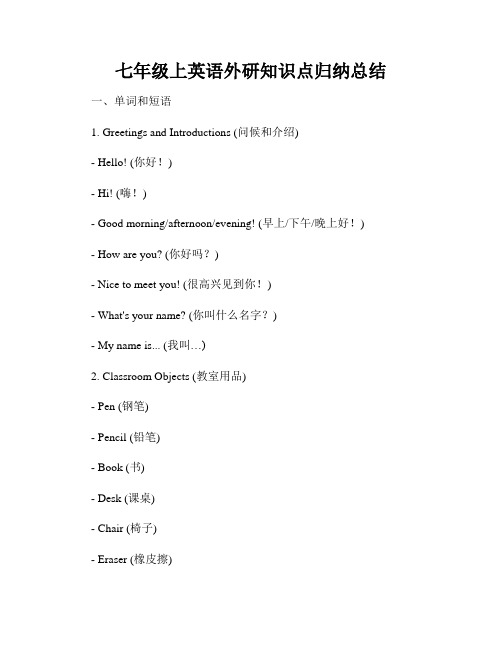
七年级上英语外研知识点归纳总结一、单词和短语1. Greetings and Introductions (问候和介绍)- Hello! (你好!)- Hi! (嗨!)- Good morning/afternoon/evening! (早上/下午/晚上好!)- How are you? (你好吗?)- Nice to meet you! (很高兴见到你!)- What's your name? (你叫什么名字?)- My name is... (我叫…)2. Classroom Objects (教室用品)- Pen (钢笔)- Pencil (铅笔)- Book (书)- Desk (课桌)- Chair (椅子)- Eraser (橡皮擦)- Ruler (尺子)- Bag (书包)3. Numbers (数字)- Zero (零)- One (一)- Two (二)- Three (三)- Four (四)- Five (五)- Six (六)- Seven (七)- Eight (八)- Nine (九)- Ten (十)4. Days of the Week (星期) - Monday (星期一)- Tuesday (星期二)- Wednesday (星期三)- Thursday (星期四)- Friday (星期五)- Saturday (星期六)- Sunday (星期日)5. Family Members (家庭成员) - Mother (妈妈)- Father (爸爸)- Brother (哥哥/弟弟)- Sister (姐姐/妹妹)6. Colors (颜色)- Red (红色)- Blue (蓝色)- Yellow (黄色)- Green (绿色)- Orange (橙色)- Purple (紫色)- Black (黑色)- White (白色)二、语法知识点1. 一般现在时- 表示经常性或习惯性的动作或状态。
外研版:初中英语上册重点短语、句型汇总
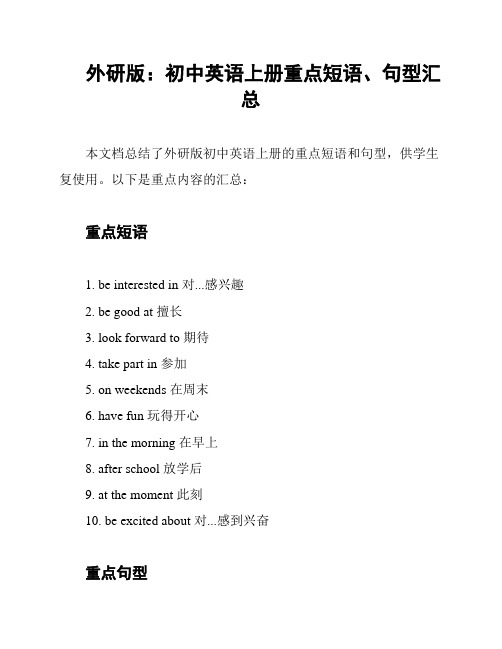
外研版:初中英语上册重点短语、句型汇总本文档总结了外研版初中英语上册的重点短语和句型,供学生复使用。
以下是重点内容的汇总:重点短语1. be interested in 对...感兴趣2. be good at 擅长3. look forward to 期待4. take part in 参加5. on weekends 在周末6. have fun 玩得开心7. in the morning 在早上8. after school 放学后9. at the moment 此刻10. be excited about 对...感到兴奋重点句型1. What's your favorite subject? 你最喜欢的科目是什么?2. I'm interested in history. 我对历史感兴趣。
3. Can I join the basketball club? 我可以加入篮球俱乐部吗?4. Yes, of course. 当然可以。
5. What do you do on weekends? 你周末都做什么?6. I usually play soccer with my friends. 我通常和朋友们一起踢足球。
7. Are you free tomorrow? 你明天有空吗?8. Sorry, I have a piano lesson tomorrow. 抱歉,我明天有一堂钢琴课。
9. What are you doing at the moment? 你此刻在做什么?10. I'm watching a movie. 我在看电影。
以上是外研版初中英语上册的重点短语和句型的汇总。
希望对学生的复习有所帮助!。
Module 1My teacher and my friends(外研版七年级上)
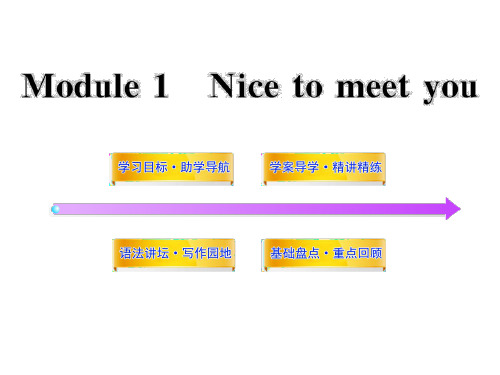
—We ________ from England.
5. —How old ________ Tim and Tom?
—They ________ thirteen.
答案:4. are, are 5. are, are
动词be是连系动词,用于连接主语和表语,说明主语
的身份、年龄、状态、性质和特征等。
【点拨】 England, English, English
【温馨提示】 巧记某国人变复数口诀
中日不变英法变,其余后面-s添。
Ⅰ. 用所给单词的适当形式填空(5分钟,10分)
1. Daming is _______ (China).
2. My pen friend is from ________ (English).
3. She is in my class. (改为否定句) She _______ in my class. 4. They are English. (改为一般疑问句,并作否定回答) — _______ they English? —No, they ________ . 5. Helen and Wang Dong are from England. (改为否定句) Helen and Wang Dong ________ from England. 答案:3. isn’t 4. Are; aren’t 5. aren’t
I’m from China and I’m Chinese.
我来自中国,我是中国人。 China 意为“中国”; Chinese意为“中国人”。 这两个名词属于专有名词,首字母要大写。 他来自英国,他是英国人,他讲英语。 He is from _______ , he is _______ , he speaks _______.
外研版七年级上册英语Module4Unit1We’vegotlotsofapples.
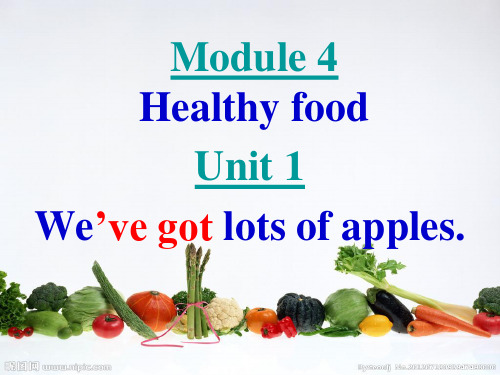
Work in groups (ABCD) A: Has he got any chocolate? B: Yes, he has. /No, he hasn’t.
√
√
×
×
Food Drink
Things Tony’s family has got at home
chocolate, apples
Let’s say说一说:
--Have you got any… ? -- Yes, I have.
-- Have you got any… ? -- No, I haven’t. -- So let’s get some.
(所以让我们去买一些)
-- Ok,good idea!
Tony and his dad are talking about going shopping. Let’s listen to the dialogue.
She has got a table.
2) 含有have / has got的肯定句变为否定 句时,在have或has后加not 即可。 have not 缩写 haven’t has not 缩写 hasn’t
e.g. They haven’t got a big television. 他们没有大电视。
food drink candy fruit meat
vegetables apples
beans
beef carrots
potatoes
chicken tomatoes
chocolate
coffee
cola
juice milk tea
water
Words and expressions
外研版英语七上Unit 4 Time to celebrate知识清单(默写版)
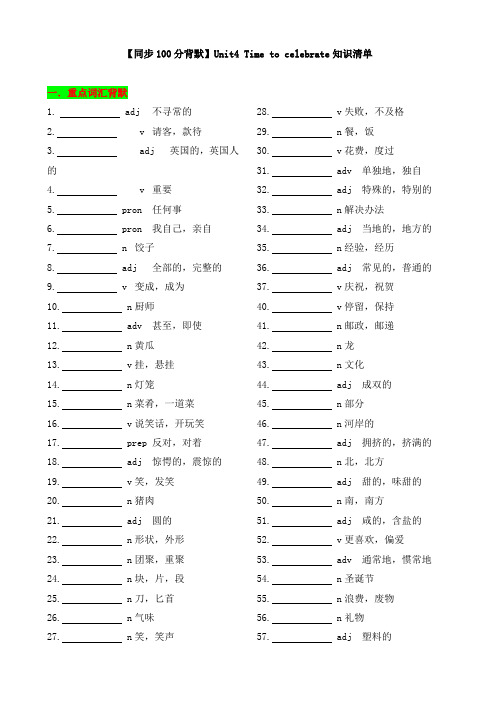
【同步100分背默】Unit4 Time to celebrate知识清单一.重点词汇背默1. adj 不寻常的2. v 请客,款待3. adj 英国的,英国人的4. v 重要5. pron 任何事6. pron 我自己,亲自7. n 饺子8. adj 全部的,完整的9. v 变成,成为10. n 厨师11. adv 甚至,即使12. n 黄瓜13. v 挂,悬挂14. n 灯笼15. n 菜肴,一道菜16. v 说笑话,开玩笑17. prep 反对,对着18. adj 惊愕的,震惊的19. v 笑,发笑20. n 猪肉21. adj 圆的22. n 形状,外形23. n 团聚,重聚24. n 块,片,段25. n 刀,匕首26. n 气味27. n 笑,笑声28. v 失败,不及格29. n 餐,饭30. v 花费,度过31. adv 单独地,独自32. adj 特殊的,特别的33. n 解决办法34. adj 当地的,地方的35. n 经验,经历36. adj 常见的,普通的37. v 庆祝,祝贺40. v 停留,保持41. n 邮政,邮递42. n 龙43. n 文化44. adj 成双的45. n 部分46. n 河岸的47. adj 拥挤的,挤满的48. n 北,北方49. adj 甜的,味甜的50. n 南,南方51. adj 咸的,含盐的52. v 更喜欢,偏爱53. adv 通常地,惯常地54. n 圣诞节55. n 浪费,废物56. n 礼物57. adj 塑料的58. n 污染60. v 能,可能59. v 引起,导致二.重点词汇拓展ual adj.通常的,平常的不平常的通常地,平常地→像平常一样2.treat v.对待,看待治疗,疗法3.I pron.(主格)我我我的我的我自己4.become v.变得;成为→+adj. 变得……→对……产生兴趣5.joke n.笑话→说笑话→开某人玩笑6.piece n.块,片,条→一张;一片;一条;一则7.knife n.小刀;匕首8.spend v.度过;花费→sb. spend some time sth.某人在某事上花费时间→sb. spend some time (in) sth.某人花费时间做某事→sb. spend some money on sth.某人花钱买某物9.alone adj.寂寞的;单身的孤独的,孤单的,寂寞的,荒凉的→感觉孤独10.culture n.文化;文明与文化有关的;文化的11.celebrate v.庆祝庆祝12.south n.南,南方 adj.向南的北方南部的,南方的13.north adj.北的,朝北的n.北方;北北方的;北部的→……的北方三.重点短语背默1.It was in .2.I wanted to , Emilia, to我想给我的英国朋友艾米莉亚吃一顿中国晚餐。
【名师推荐资料】七年级英语上册 Module 3 My school词句精讲精练 (新版)外研版
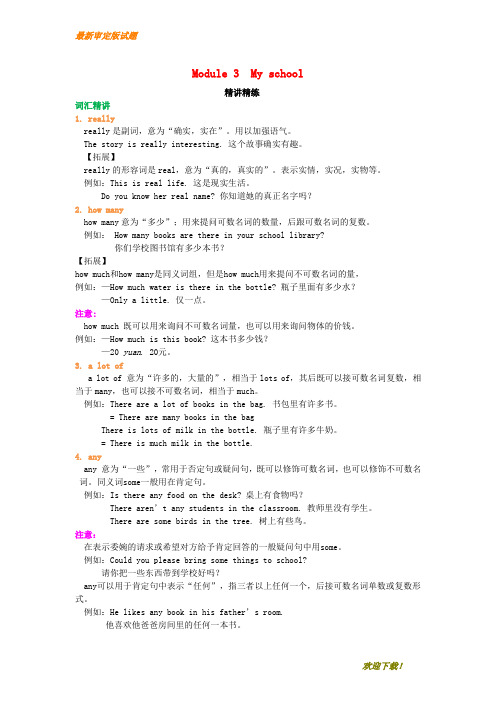
Module 3 My school精讲精练词汇精讲1. reallyreally是副词,意为“确实,实在”。
用以加强语气。
The story is really interesting. 这个故事确实有趣。
【拓展】really的形容词是real,意为“真的,真实的”。
表示实情,实况,实物等。
例如:This is real life. 这是现实生活。
Do you know her real name? 你知道她的真正名字吗?2. how manyhow many意为“多少”;用来提问可数名词的数量,后跟可数名词的复数。
例如: How many books are there in your school library?你们学校图书馆有多少本书?【拓展】how much和how many是同义词组,但是how much用来提问不可数名词的量,例如:—How much water is there in the bottle? 瓶子里面有多少水?—Only a little. 仅一点。
注意:how much 既可以用来询问不可数名词量,也可以用来询问物体的价钱。
例如:—How much is this book? 这本书多少钱?—20 yuan. 20元。
3. a lot ofa lot of 意为“许多的,大量的”,相当于lots of,其后既可以接可数名词复数,相当于many,也可以接不可数名词,相当于much。
例如:There are a lot of books in the bag. 书包里有许多书。
= There are many books in the bagThere is lots of milk in the bottle. 瓶子里有许多牛奶。
= There is much milk in the bottle.4. anyany 意为“一些”,常用于否定句或疑问句,既可以修饰可数名词,也可以修饰不可数名词。
外研版(2024)七年级上册英语期中专题训练∶根据汉语提示完成句子(含解析)

2024年外研版七年级上册英语期中专题训练∶根据汉语提示完成句子1.他很喜欢音乐,并且学会了弹钢琴。
He liked music very much and learned to .2.在西方国家,周日是一周中的第一天。
In Western countries, Sunday is of a week.3.陈洁在商店里买了一些礼物。
Chen Jie bought some in the shop.4.盒子里有一双鞋子。
There is in the box.5.安迪很高兴在羽毛球俱乐部结交新朋友。
Andy is really happy to in the badminton club.6.在冬天,人们通常把花放在室内,以保护它们免受寒冷天气的伤害。
In winter people usually keep flowers indoors to them the cold weather. 7.你的音乐老师是怎样的?your music teacher8.如果你环顾四周,你会发现路边有许多野花。
If you , you will find a lot of wild flowers by the side of the roads.9.他们正在打篮球还是排球?Are they basketball volleyball10.我经常使用我的手机搜索有用的信息。
I often use my mobile phone to useful information.11.我整个周末都待在家睡觉了。
I at home all weekend and .12.穿过森林,你能发现一座山。
the forest, and you can find a hill.13.——你周末做什么?——我经常弹吉他。
—What do you do on weekends—I often .14.他指出我的错误,然后我意识到我错了。
We+start+work+at+nine+o'clock 外研版英语七年级上册
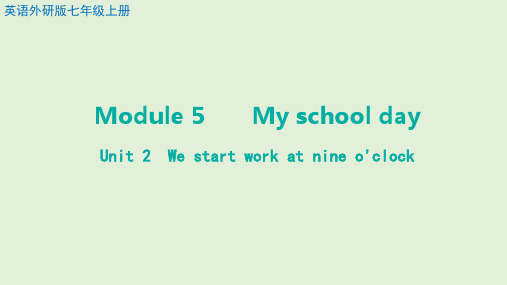
the morning and three in the afternoon.
( B )1.A.Saturday
B.Monday
C.Thursday
D.Tuesday
( D )2.A.dinners B.questions C.schools
D.classes
Today is Friday.I have English at 8:00.The science class is at 9:00.I think
A.Alex's weekdays. C.Alex's friends.
B.Alex's subjects. D.Alex's family.
二、细读Unit 2 Act.1课文,完成思维导图,并复述课文。 breakfast lessons
home have dinner go to bed
考点梳理
▶点拨
( C )3.We often have three meals
have
breakfast at 8:00 every morning.
day.And we usually
A.a; the
B.a; a
C.a; /
D./; the
4.We have milk and bread for breakfast.(盲填,一词)
my friends.They go to the playground and play football, 7 I don't like
football.
We have lunch in the dining hall at half past twelve.I like school lunch!
外研版七年级上册Module 8 Choosing presents Unit 2 She often goes to concerts.
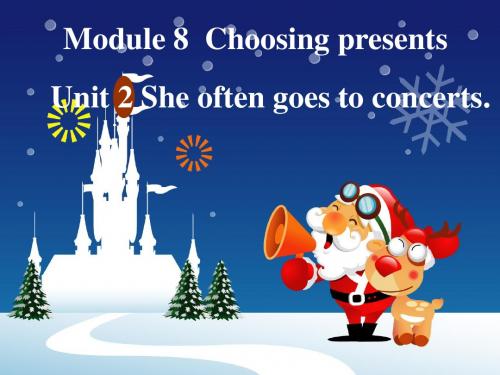
Learning to learn
In English we often use two words for
one idea or things: cinema ticket,
concert ticket, football match, tennis
match. When you write them down,
What …often do at wendends?
get some exercise go shopping
go to the cinema
go to concerts
Watch football matches on television
Fast reading
Daming’s grandparents
scarf-scarves
many+可数n复数.
a lot of/lots of much+不可数 n.
leaf-leaves
Para.3&4 Listen and fill in reading Betty’s cousin likes _______ and she reads lots of books and magazines. She also likes films cinema ______ and often goes to the _______, but she never watches sport. Tony’s sister likes music. She likes going to concerts but it’s often expensive. She buys CDs of her favourite songs.
Para.2 Read and fill in Daming’s mother likes chocolate, but she doesn’t often buy any because it isn’t very _________. She likes ______________ and healthy going shopping always buys __________clothes. She has got expensive 11_______________, 20 dresses and a lot of silk scarves shoes _______. She spends a lot of money.
七年级上册英语外研版重点单词和句型

七年级上册英语外研版重点单词和句型一、单词部分1. school (n.) 学校2. teacher (n.) 老师3. student (n.) 学生4. book (n.) 书5. pen (n.) 钢笔6. desk (n.) 课桌7. ch本人r (n.) 椅子8. class (n.) 班级9.puter (n.) 电脑10. wall (n.) 墙11. whiteboard (n.) 白板12. door (n.) 门13. window (n.) 窗户14. blackboard (n.) 黑板15. classroom (n.) 教室16. library (n.) 图书馆17. playground (n.) 操场18. cafeteria (n.) 餐厅19. restroom (n.) 洗手间20. gymnasium (n.) 体育馆二、句型部分1. What's your name? 你叫什么名字?2. My name is Peter. 我叫彼得。
3. How old are you? 你多大了?4. I am twelve years old. 我十二岁。
5. Where are you from? 你来自哪里?6. I am from China. 我来自我国。
7. What do you like? 你喜欢什么?8. I like playing basketball. 我喜欢打篮球。
9. Do you have any brothers or sisters? 你有兄弟姐妹吗?10. Yes, I have a sister. 是的,我有一个妹妹。
11. What subjects do you study at school? 你在学校学什么科目?12. I study Chinese, math, English, and science. 我学中文、数学、英语和科学。
外研版七年级上册英语Module 9 Unit 3 Language in use
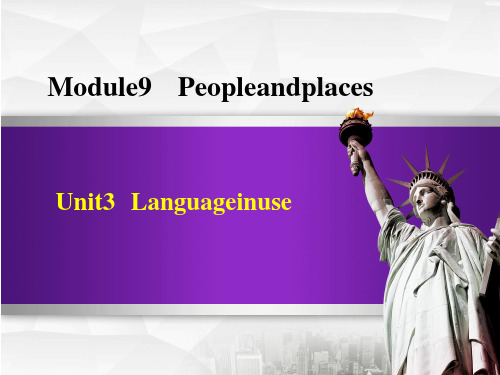
(四川南充)
A.iswatching
B.watches
C.watched
【点拨】此题用题眼法解答。根据题眼look可知应用现在 进行时,故选A。
拓展一
表示当前一段时间或现阶段正在进行的动 作,且有thisweek,thesedays等时间状语 时,常用现在进行时。 eg:Wearemakingmodelplanesthesedays.
【点拨】此题用题眼法和转换法。根据问句中的“now”可 知用现在进行时态;又因为此句的主语是Who,其谓语动 词一般按单数对待,所以,空白处应填“isrunning”。
考向二
run还可以表示“管理;开动(机器)”等含义。 eg:MrWangrunsabigcompany. 王先生管理着一家大公司。
Learningtolearn Whenyoureviseyourvocabulary, choosewordswhichareusefulforyou,
andwritetheminsentences.
postcard:OnholidayIusuallysendfourorfivepostcardsto myfriends.
Aroundtheworld
Timezones IntheUS,fromNewYorktoHawaii, thereareseveraltimezones. It'smiddayinNewYork, andpeoplearehavinglunch. It's9: 00aminLosAngeles, andchildrenarestartingschool. InHawaii,it's7
•Talkaboutnewsyouwouldliketoreport. •Listtheactivitiesyouwouldliketoreport. •Makenotesaboutthenews. •Writewhatyouaregoingtosay.
外研版七年级英语上册《Module 4 Healthy food Unit 3 Language版

14. chocolate 巧克力 15. fish 鱼肉
16. cheese 奶酪
17. sugar 糖
18. candy 糖果
19. soup 汤
C.可数名词的特殊变化:
1. child—children 孩子
2. tooth—teeth 牙齿
Complete the sentences with the words
B.完成句子: 1.你最喜欢的食物和饮料是什么?
What _is__y_o_u_r_f_a_v_o_u_r_it_e__ food and drink? 2.多喝水是非常重要的。
It’s very _im__p_o_r_ta_n__t _to__d_r_in__k more water. 3.牛奶、奶酪和鱼对你的牙齿有益。
4.A__re_ _t_h_e_re_ any cakes in your bag? 5. _H__a_v_e you _g_o_t_ a white shirt?
同步P36
A) 构成方法及读音规则
1) 一般情况加 –s:map-maps boy-boys
清辅音后读
浊辅音和元音后读
2) 以s, sh, ch, x等结尾加 –es,如:
from the box.
bit delicious important remember stay 1. R__e_m_e_m__b_e_rto buy some fruit. 2. It’sim__p_o_r_ta_n_t__ to eat healthy food. 3. Eat well and _st_a_y_ healthy. 4. Orange juice is _d_e_li_c_io_u_s_. Let’s buy
外研版英语七年级上资料

外研版英语七年级上资料外研版英语七年级上资料Module One1.总结am、is are的⽤法:My name Miss Li. I Chinese.He - my friend. We - students.What your name? Where you from?1.My mother ____ a teacher.2.Your sister ____ ten years old.3.His students ____ all in the classroom.4.You and I ____ good friends.5.Lucy ____ an English girl.She ____ in Class Two this year.6.You ____ our Chinese teacher this term.2.互译下列单词短语句⼦:1.close_____________________2.open_________________________3.遇见______________________4.⼗⼆________________________5.学⽣______________________6.英语______________________7.practise____________________ 8.match ___________ ___ 9.起⽴_____________ __ 10.坐下___________ _11.What’s your name?________________ __12.Where are you from?___________ __13.Nice to meet you.__________ ___14.我⼗三岁。
____ ___单项选择:1. -Nice to meet you. - .A Good morningB You are welcomC Nice to meet you, tooD Goodbye2.He from Beijing, I from Shanghai.A is,isB am, amC is, amD is, comes3. Please match the words the picture.A toB andC withD too4. –is Mary from? -She is from .A When, AmericanB Where, AmericaC What, FrenchD Where, French5. My sister is .A twelve year oldB twelve years oldC twelve-years old2. 单项选择1)- are you? -I’m thirteen years old.A WhatB WhereC How oldD How2) Mike is from and he is .A Chinese, ChinaB America, AmericanModule 21. 中英⽂互译。
外研版七年级上册英语-Module2-知识点及练习

Module2M2:next to 在……的旁边 in front of (in the front of)在……的前面 a photo of 一张……的照片 on the left 在左边 on the right在右边 bus station 公共汽车站 at a police station在警察局the manager of a theater剧院的经理 in America在美国 many people许多人 for example 例如 family tree家谱 bus driver公共汽车司机 at the same hospital在同一家医院1. M2:1.This is a photo of Tony’s family.这是托尼的一张家庭照。
2. of “……的”,A of B “B的A” a map of china 中国地图3. family “家庭,家人”复数形式families,表示家庭整体,谓语动词要用单数形式。
表示家庭成员,谓语动词用复数形式。
4. 感叹句,表示强烈感情。
What+a/an+形容词+单数可数名词+主语+谓语动词!=HOW+形容词+a/an+单数可数名词+主语+谓语动词!【What a big family !=How big the family is!好大的一个家庭啊!句子结构:What (a/an )+形容词+名词+主语+谓语(+其它)!→感叹名词How +形容词/副词+主语+谓语(+其它)!→感叹形容词/副词5.Who are the boy and the girl in front of Paul?在保罗前面的男孩和女孩是谁?who 询问身份,语序用陈述语序。
6.What’s your father’s job?你爸爸做什么工作?7.询问某人职业的句型:what +be动词+主语?例:What are your parents?What +助动词+主语?例:What do your parents do ?What kind of job/work +助动词+主语?例:What kind of job/work do you do ?、8. My dad’s parents are on the right .我爸爸的父母在右边。
外研版七年级英语上册Module 5 My school day Unit 2 We start work at nine o’clock.教案

Module 5 My School DayUnit 2 We start work at nine o’clock.一、学习目标:1. 重点单词:2. 重点短语:go to school,get up, have breakfast, have lunch, go home, have dinner, go to bed, go to sleep3.重点句子:1) I love history.2) It’s twelve o’clock .3) We have Chinese at eight o’clock.4) We don’t have maths.5) —Do you like maths?—Yes, I do.6) In the evening, I watch TV and have dinner with my family.7) I get up at half past seven in the morning and have breakfast.8) I drink Cola or water.9) We start work at nin e o’clock.二、重点及难点:1.时间的表达方式。
2.用在时间前的介词(at , in , on)的用法。
3.一般现在时的陈述句形式(主语为I, they, we, you)。
4.And 连接的两个简单句。
三、教学设计:Unit 2 We start work at nine o’clock.ⅠTeaching modelReading and writing .ⅡTeaching methodInteractive approachⅢTeaching aims1. To get information from a description of a school day .2. To be able to put pictures in order according to the reading material .3. To write about one’s school day .4. To learn to join simple sentences with and .ⅣTeaching ObjectivesKey vocabulary: week, house, start, work, break, evening, watch, homework, bed, sleepKey phrase: go to school,get up, have breakfast, have lunch, go home, have dinner, go to bed, go to sleepKey structures: This is my school day . I get up at …Lessons start at …We have a break and talk to our friends.ⅤTeaching aidsRecorder , OHP , videoⅥTeaching StepsStep 1 Warming-up1. Review the text of Unit 1 .2. Show some pictures, ask the students to look at the pictures , then talk something about the pictures.3. Introduce the new words .4. Read the new words .Step 2 Read the passage and match the times with the pictures in Activity 1.1. Read through the passage and order it individually.2. Check with a partner .3. Call back the answers from the whole class .Keys: 1. e 2. f 3. d 4. a 5. b 6. cStep 3 Match the times with the pictures in Activity 1 .1. Read out the times and have the students repeat them after you .2. Ask them to match the times and the pictures individually.3. Check with a partner .4. Call back the answers from th e whole class .Keys: 7:30 e 10:00 c 11:00 d 12:30 a 3:30 b 9:00 fStep 4 Check (√) the true sentences.1. Read the passage again.2. Ask the students to choose the correct answers .1) I get up / start work at half past seven.2) We have a break / have lunch at half past twelve.3) I go home / watch TV in the evening.4) I do my homework / see my friends in the evening.5) I go home / go to sleep at ten o’clock.3. Ask the students to check with a partner.4. Play the recording again .Check the answers:Keys:1. get up2. have lunch3. watch TV4. do my homework5. go to sleepStep 5 Do exercises:I’m Alex Greenall. I (1)_______ at half past seven (2)________ the morning. I go to school at (3)________ and lessons (4)________ at nine o’clock. We have (5)________ lessons in the morning. I (6)_________ at eleven o’clock. I don’t like (7)________. We have lunch at (8)__________. Lessons start in the afternoon at (9)__________ . We have (10)_______ lessons in the afternoon . We (11)_________ at half past three. I go to bed at (12)________ o’clock.Keys: 1.get up 2.in 3. half past eight 4. start 5. four 6. have a break 7. football 8. half past twelve 9. half past one 10. two 11. go home 12. ten Step 6 Writing and speaking.A. Talk about your school day .1. Read through the phrases and have the students repeat them .2. Ask them to talk about their school days .B. Look at these sentences .I get up at seven o’clock . I go to school at eight o’clock .I get up at seven o’clock, and then go to school at eight o’clock .C. Now join these sentences with and then .1) In the morning, we get up. We go to school.2) In th e afternoon, we have lessons. We play football in the playground.3) In the evening, I have dinner. I do my homework.4) In the evening, I do my homework. I go to bed.D. Call back the answers from the whole class .Keys:1. In the morning, we get up, and then go to school.2. In the afternoon, we have lessons, and then we play football in the playground.3. In the evening, I have dinner, and then do my homework.4. In the evening, I do my homework, and then go to bed .Step 7 Grammar一般现在时:表示现阶段经常发生的动作或存在的状态。
外研版七年级英语上册Module3__Unit2

5./’laɪbrəri/ library图书馆
6./’ɒfɪs/
office办公室
7./’pleɪ,graʊnd/ playground操场
8./’saɪəns/ science科学;科学课
9./læb/
lab实验室
10./bɪ’haɪd/ behind在---后面
Words and expressions
3.Listen and read the passage again and label the map of the school.
3 Classroom 2 School office building
4 Dining hall
5 Sports hall
1 Library
6 Science building
Millie sits __i_n_f_r_o_n_t_o_f__ me. Amy sits __b_e_tw__e_e_n_ Millie __a_n_d__Simon. Kitty sits _n_e_x_t_t_o_/b_e_s_i_d_e_ Sandy. Sandy sits __b_e_tw__e_e_n_ Kitty __a_n_d__ me. Kitty sits ___b_e_h_i_n_d___ Simon.
same building? Yes, they are.
Now answer the questions. Use short forms.
1. —Where’s the playground?
— I_t_’_s in the middle of the school.
2. — Where are the science labs?
There are 24 classrooms
七年级英语上册 Module 4《My family》精练精析 外研版
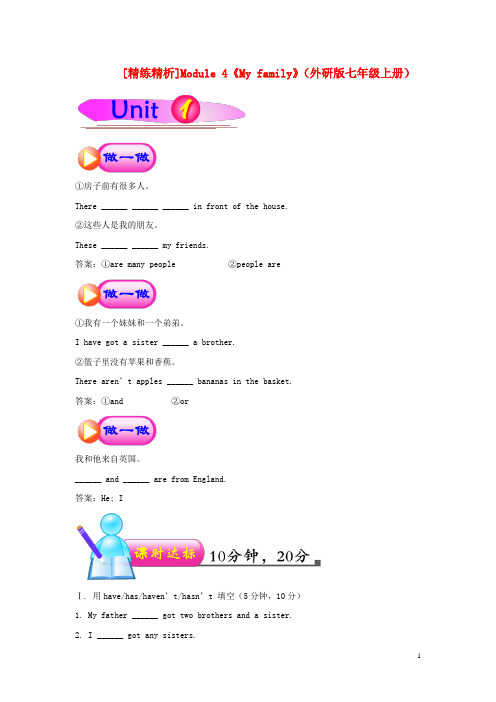
[精练精析]Module 4《My family》(外研版七年级上册)①房子前有很多人。
There ______ ______ ______ in front of the house.②这些人是我的朋友。
These ______ ______ my friends.答案:①are many people ②people are①我有一个妹妹和一个弟弟。
I have got a sister ______ a brother.②篮子里没有苹果和香蕉。
There aren’t apples ______ bananas in the basket.答案:①and ②or我和他来自英国。
______ and ______ are from England.答案:He; IⅠ. 用have/has/haven’t/hasn’t 填空(5分钟,10分)1. My father ______ got two brothers and a sister.2. I ______ got any sisters.3. —______ you got a happy family? —Yes, I ______ .答案:1. has 2. haven’t 3. Have; have4. — ______ he got a little brother?—No, he ______ .5. My mum ______ got any uncles or aunts.答案:4. Has; hasn’t 5. hasn’tⅡ. 用所给词的适当形式填空(5分钟,10分)1. Are they your ______ (brother)?2. There are three people in ______ (Tom) family.3. ______ (they) names are Linda and Jim.4. Kate ______ (have) got a grandmother.5. The old man and the old woman are my ______ (grandparent).答案:1. brothers 2. Tom’s 3. Their 4. has 5. grandparents句型展示台1. 你有一个小家庭还是一个大家庭?______ you got a small family ______ a big family?2. 我有一个小家庭。
- 1、下载文档前请自行甄别文档内容的完整性,平台不提供额外的编辑、内容补充、找答案等附加服务。
- 2、"仅部分预览"的文档,不可在线预览部分如存在完整性等问题,可反馈申请退款(可完整预览的文档不适用该条件!)。
- 3、如文档侵犯您的权益,请联系客服反馈,我们会尽快为您处理(人工客服工作时间:9:00-18:30)。
初一第一学期词组或日常英语name: ____________Starter1.Hello, class. 同学们,你们好!2.My name’s Miss Zhou. 我叫周老师。
3.Good morning, Miss Zhou.早上好,周老师。
4.Good afternoon, class. 下午好,同学们。
5.Good evening. 晚上好。
6.Good night. 晚安。
7.Goodbye. 再见!8.What’s your name? 你叫什么名字?9.Sorry! 对不起!10.Can you spell it? 你能拼写它吗?11.How are you? ---- 你(身体)好吗?Fine, thank you ----好,谢谢。
你呢?I’m fine, too. ---- 我也好!12.This is Miss Zhou. She is my teacher.这是周小姐。
她是我的老师。
13.Nice to meet you. 很高兴认识你。
14.That’s my friend. Her name is Lingling.那是我的朋友,她的名字叫玲玲。
15.It’s time to go. See you tomorrow是时候走了。
明天见!16.Please stand up! 请起立!17.Sit down. 坐下18.Open / Close your book.打开/合上你的书。
19.Put up your hand.举起你的手20.I’m sorry, I can’t. 对不起,我不能。
21.What class are you in? 你在哪个班?22.I’m in Class Nine, Grade One.我在一年级9班。
23.What’s your telephone number?你的电话号码是多少?24.How old are you? 你几岁了?25.How many people are there in your family?你们家有多少人?26.There are five people in my family.我们家有5个人。
27.What’s this in English?这个用英语怎么说?28.Please write it on the blackboard.请把它写在黑板上。
29.Thank you. 谢谢你。
30.You are welcome. 不客气。
31.How do you spell it? 你怎样拼写它呢?32.Can you help me? 你能帮助我吗?33.Yes, of course. 是的,当然。
34.Sorry, I don’t know.对不起,我不知道。
35.Can you say that again?你能再说一遍吗?36.What colour is it? 它是什么颜色的?37.What day is it today? 今天星期几?38.Write it in your book.把它写在你的书上。
39.What day is your favourite day?你最喜欢星期几?40.Autumn is cool. 秋天是凉快的。
41.Summer is hot. 夏天是炎热的。
42.Winter is cold. 冬天是寒冷的。
43.Spring is warm. 春天是暖和的。
44.What’s the weather like in Beijing in spring?北京春天的天气怎么样?45.Let’s play basketball after school.让我们放学后打篮球吧。
46.Good idea! 好主意!47.I go swimming on Wednesday.我周三去游泳。
48.I like running. 我喜欢跑步。
Module 11.be from / come from来自2.How old…?多少岁(多大)?3.thirteen years old 13岁4.What about…? …怎么样?5.Welcome to…欢迎到…来6.the capital of ……的首都7.family name姓8.given name 名9.Glad to see you. 很高兴见到你。
Module 21. a photo of……的照片2.These are…这些是…3.Those are…那些是…4.on the left 在左边5.on the right 在右边6.next to…在…隔壁7.in front of …在…前面8.What’s your father’s job? / What does yourfather do? 你爸爸是做什么(职业)的?9.family tree 家谱Module 31.There is / are…...(地方)有…2.be like…像…样子的3.How many…? / How much…?多少?4. a lot of…大量的5.at the front of …在…前部6. a map of …一幅…地图7.on the left of…在…的左边8.between … and …在…和…之间Module 41.go shopping for…去买…2.have / has got …(人)有…3.haven’t / hasn’t got …(人)没有…4.too many…太多…5.be good for …对…有好处6.what kind of…? 哪种…?7.lots of …大量的8.be bad for…对…有害9.How about…? …怎么样?10.All right! 好吧!11.a bit 一点点12.It’s important to … (做…)是重要的13.eat well 吃得好14.stay healthy 保持健康15.get fat 变胖16.have a good breakfast 吃个好早餐17.every morning 每天早上18.buy… for …买…给…19.for breakfast 作为早餐Module 51.seven o’clock 7:002.half past twelve 12:303. a quarter past eight 8:154.twenty past eleven 11:205.ten to three 2:506.talk with…跟…谈话7.be good at…擅长8.what time…? 几点?9.have lessons 上课10.have maths 上数学11.start work 开始工作12.go to school 上学13.on weekdays 在工作日14.get up 起床15.in the morning 在早上16.in the afternoon 在下午17.in the evening 在晚上18.have breakfast 吃早餐19.have lunch 吃午餐20.have dinner 吃晚餐21.have a break 课间休息22.go home 回家23.watch TV 看电视24.do homework 做作业25.go to bed 去睡觉Module 61. a trip to …到…游览2.welcome to…欢迎到…3.many kinds of…很多种…4.such as…比如5.look at…看…6.Shall we go…? 我们去…好吗?7.over there 那里8.as well as …并且,还9.all over the world 全世界Module 71.connect … to…把…连接到…2.turn on 开(电器)3.turn off 关(电器)4.share with…和…分享5.go on the Internet 上网6.make travel plans 制定旅游计划7.check the times of trains 查火车时间8.listen to music 听音乐9.watch movies 看电影10.search for…搜索…11.check emails 查邮件12.send emails to …发送邮件给…13.play computer games 玩电脑游戏e… to…用…去做…Module 81.Would you like to…你愿意…吗?2.Yes, I’d love to. 我愿意。
3.in English 用英语4.on Teachers’ Day 在教师节5.go to concerts 去听音乐会6.spend money 花钱7.go to the cinema 去看电影8.on television 通过电视9.at weekends 在周末10.give… to…把…给…Module 91. a lot 非常2.on the Great Wall 在长城上3.the others 别的4.right now 现在5.take photos 拍照6.on sale 正在出售,打折7. a few 一些8.in the sun 在阳光下9.by email 通过邮件10.at this moment 此时此刻11.leave work 下班12.wait for 等…13.get off 下(车)14.have afternoon tea 喝下午茶15.thanks for…为…而感谢16.at the moment 现在17.next week 下周Module 101.This is … speaking. (打电话时)我是…2.get ready for…为…做准备3.at work 在工作4.put away 把东西收拾好5.work hard 努力工作6.cood the meal 煮饭7.learn a dragon dance 学舞龙8.sweep the floor 扫地9.Hurry up! 快点10.Spring Festival 春节11.bad luck 霉运12.on the same day 在同一天13.sweep away 扫走14.so many / much 那么多15.a kind of …一种…完成句子M11.你是哪里人?我是中国人。
Where _____ you ________? I am ______.2.你堂弟几岁了?10岁。
---________________ your cousin? ---Ten. 3.我们班有2个中国人,3个美国人,4个澳大利亚人。
